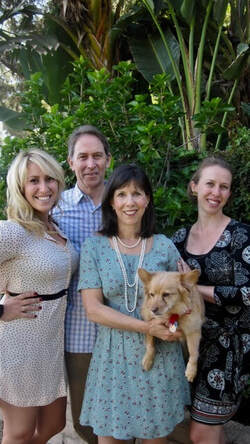
I also became a stepmother of adult children when I got married. And I received plenty of unsolicited comments on how hard that was going to be as well.
.My situation is different, I thought. I had no kids of my own and I looked at having stepchildren — two girls (Meg and Abby) — as a huge plus. The “girls” were young adults, ages 18 and 22, and loved their dad very much. They wanted him to be happy and were very accepting of me. They couldn’t have been more welcoming. I thought it was all perfect.
But even in the best of situations, there are growing pains when you are thrown into a stepparenting role.
In my case, it was the proverbial “caught between a rock and a hard place” situation. I was not their girlfriend, but not their parent either. So where did I fit in? How did I fit in?
It took some finessing. Somehow, though, we grew to love and appreciate one another beyond my wildest hopes.
I was not their girlfriend, but not their parent either. So where did I fit in? How did I fit in?
Yes, I made mistakes, which I hope I learned from. But I did a few things right, too, fortunately.
My 7 Stepparenting TipsHere are seven stepparenting tips I can pass along:
1. Be aware of your place. Remember, this family existed before you came along and they have their own patterns of behaviors. It’s going to be frustrating at times. You didn’t raise these kids, and you may not agree with how they interact, their expectations or even the way they treat one another. Accepting this can be tough at times. But doing so will help you further a better relationship with both your spouse and stepchildren.
2. Don’t weigh in on parent/child issues unless asked. I didn’t learn this as early as I wish I had. It’s easy to feel comfortable enough with people you love to say anything, but I don’t advise it. I made the mistake of giving my opinion too freely and that has come back to haunt me at times. When issues come up between parents and their adult children, let them work it out unless you are specifically asked. Respect their interactions with one another. Sometimes it is better to sit back and be an objective observer. In the long run, it will serve you well.
3. Set boundaries early. When the relationship is new, you want to do everything to make your stepkids like you, so sometimes you may go a little too far. Then, you will set expectations that’ll be hard to keep. In my case, the girls and I definitely had our own “honeymoon period.” So, I was okay with them borrowing possessions without asking or coming into the bedroom or home office without knocking. However, these are the kinds of things that might make you resentful eventually, and patterns can be hard to reverse.
4. Support their relationship with their parents. One of the things I admire most is how much my stepkids love their father. I love to see them spend time together. One of my stepdaughters often talks about her other friend’s “step-monster” stepparents, who begrudge their spouses time with their kids and are jealous of that time together. I’ve seen this kind of thing unravel otherwise good relationships. Personally, I could not respect someone who didn’t prioritize their children.
I recently asked my now 37-year-old stepdaughter, Abby, how she felt about this when she was 22. “Looking back, one of the nice things was that my sister and I were able to keep our one-on-one relationship with my dad,” said Abby. “We never felt threatened that our relationship with him would change.” This is still gratifying to hear, and I still encourage alone time with their dad. I’m honored when the girls insist on including me.
5. Be tactful in criticizing. As much as you may grow to love your stepchildren, you don’t really earn the right to be critical of them. When asked for your opinion by your spouse, proceed with caution. The old adage, “It’s okay for me to say it, but not you” is often the case. Even when you agree, it’s just better not to be the first one to say so.
6. Learn to take criticism. I often joke that I had great self-confidence before I had stepdaughters. If they feel I’m wearing the wrong jewelry or having a bad hair day or if they just don’t like my outfit, they will let me know. At first, I was taken aback and felt defensive and hurt. I’ve learned to listen, and now take it as a sign of love. After all, they took the time to notice and care. And they are usually right!
7. Don’t compete. I knew enough not to try to be the girls’ mother or to compete with that relationship in any way. But I also knew that, even though the “kids” were basically grown-ups, I was walking into a parental situation. I give parental-type advice when asked. But I know they have a mother and I wholeheartedly respect that relationship and would not think of interfering with it.
We Know We Can Count on Each OtherIn 15 years, my stepdaughters and I have been there for each other through many of life’s ups and downs. And some of the ups and downs have been extraordinary. Four years after my husband and I were married, Meg — 22 at the time — was diagnosed with Hodgkin’s lymphoma. Five years later, Abby, at 30, was diagnosed with the same cancer.
They both came home for treatment and six months of intense chemotherapy. I am happy to say they are both healthy now, living productive lives in Northern California. As incomprehensible as this sounds, the experience was bonding for all of us, and it was an honor to be there to take care of them.
I asked Meg, now 32, for her thoughts about my role as her stepmother. “Exactly what you have described is no different than how I treat, or look at, my father or my mother,” she says. “When I miss you, I call. When I need advice, I call. When I think of a joke you’d love, I text.”
Meg continues: “I would suggest that this proves this isn’t a stepparent/daughter relationship, but rather exactly how daughters would relate to their parents.”
My daughters have been there for me through the death of my mother and other significant life events; we’ve cried and celebrated together. We know we can count on each other. And I couldn’t be more grateful for them than if I had been their “real” parent.

 RSS Feed
RSS Feed